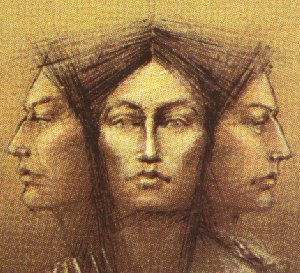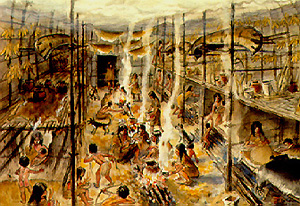 |
Iroquois Woman
![]()
In the Iroquois community,
women were the keepers of culture. They were responsible for defining the
political, social, spiritual and economic norms
of the tribe. Iroquois society was matrilineal, meaning descent was traced
through the mother rather than through the father, as it was in Colonial society.
While Iroquois sachems (chiefs-leaders) were men, women nominated them for
their leadership positions and made sure they fulfilled their responsibilities.
Besides performing the normal household functions of producing, preserving and preparing food and clothing for the family and taking care of the children, Iroquois women participated in many activities commonly reserved for men. They gambled, they belonged to Medicine Societies (spiritual associations) and they participated in political ceremonies.
The Iroquois
were an agricultural people and it was the women who owned the land and tended
the crops. After marriage, an Iroquois man moved into the longhouse  of
his wife's family. Their children then became members of her clan.
of
his wife's family. Their children then became members of her clan.
Iroquois women had great influence in their communities and women such as Molly Brant became great leaders in their own right. While Iroquois society was far from being a female dominated matriarchy, Iroquois women enjoyed social equality and respect that was not shared by colonial women.
Learning Aids | Great Law of Peace | US Constitution | Timeline | Works Cited
© 1 October 2001, Portland State University